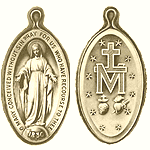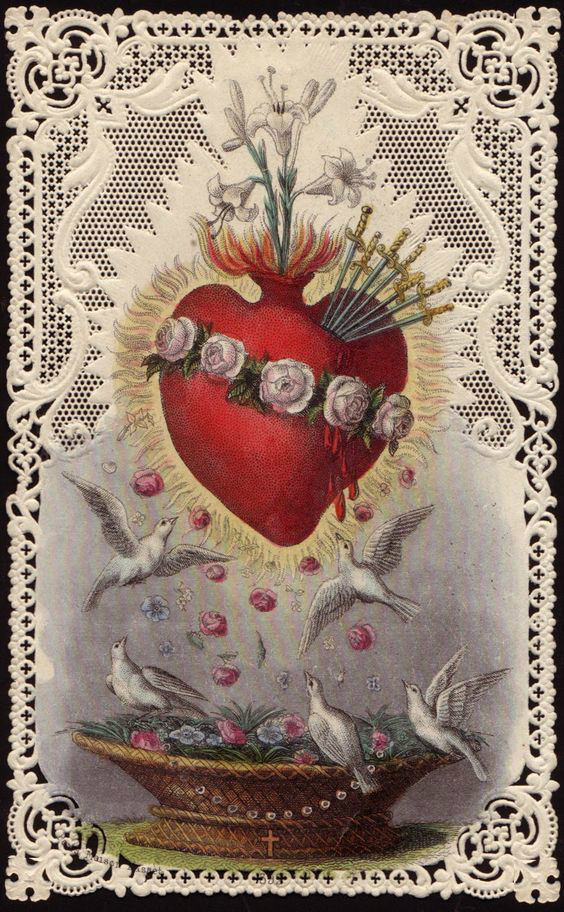He avoided the sight of women with such determination that he would turn another way when he met them in the street, or if he could not do that, would
pull down his hat over his eyes and quicken his pace so much that his companion would be obliged to run to keep up with him. But the finest thing was to see him when these meetings occurred in some narrow lane; then he would either turn back, or would flounder through the mud, without caring about getting his clothes dirty and being laughed at as a fool, so that only he might
avoid any risk of troubling the purity of his soul.
In Florence one of his religious said to him: "I saw the queen of France today." But he screwed up his eyes and with some severity said to him: "And I would not have moved a step to see a woman." And not only did he avoid looking at women, but he used every possible precaution not to allow them to approach near him; and it was one of his greatest annoyances to have to listen to some lady-benefactress, who perhaps had come to him with a long story about her troubles, to have his advice and comfort.
One day a lady, in order to be heard better, kept trying to get nearer him, but the more she moved on, the more Camillus went back, so that at last they had moved their chairs half across the room.
He would never remain alone with any woman, however holy she might be, and there was no possible means that he would leave untried to prevent their kissing his hand: and if he ever had it kissed unawares, he would then with holy modesty secretly wipe it over and over again on his cloak, to the great astonishment of others.
...
A woman was once waiting at the gate of the Maddalena for Camillus to return, that she might kiss his hand and receive his blessing. When he came, she approached to perform what she intended. But Camillus would not allow her and went to ring the bell, wishing to escape the snare. The good woman saw this and renewed her entreaties with greater warmth. In the meantime the gate was opened, and the Saint leaped in, and covering his face with his right, saying: "God bless you, go in peace," and then he had the door shut directly [immediately] and would not even look at her.
Nor could he endure to see other persons stay to talk with women, and when this occurred with any of his religious, he always rebuked them severely....
He would never allow, either in men or women, any of those vanities in dress which could possibly excite any thought against purity. Thus he spoke very harshly to a young lady, a relative of his, for taking too much care in arranging her hair, and rebuked her father for allowing such idle vanities. Whenever he spoke in church, he blamed the ornaments of the women, and he would not allow his religious to speak of the fashions of dress, saying that, in the matter of chastity, persons ought to have a scruple about the very smallest things, if they wished to preserve it.
...
Nor was it only with others he was thus reserved: but he ever showed himself most scrupulous about his own person: so that when his hair was cut, he would not loosen his collar for fear of displaying his neck; and once when the physician ordered him a bath, when he came out, he caused himself to be covered up, and seeing just the end of his foot uncovered, he told the lay brother to help him to cover it, and showed great anxiety about it.
...
He avoided all places where there was singing, music, or dancing; and while he was in church making mental prayer with his religious, if he heard music or singing in the street, he would shake his head, and spit, and cough, and make noises, to prevent the sounds coming to his own or to his companions' ears.
...He was not satisfied with only rebuking this vice, without giving proper remedies to prevent it. Besides advising persons to avoid every, even the least, occasion of it and to give themselves to prayer, he taught that the flesh is not easily bridled, except by a continual mortification; and he adopted the words of Jesus Christ: "This kind of devil is not cast out but by prayer and fasting." His exhortation was the more efficacious as it was backed by his example; for though his body was already emaciated by his labors and by the pain of his wound, he exercised it with continual fasts, with discipline, hair shirts, and other instruments of penance. And although God had given him the privilege of being free from all temptations of the flesh, so that he felt no evil desires, yet for all this he did not think himself safe, but always stood on his guard, so that he would not even feel the pulse of sick women, unless their hand was covered with the sheet or with their bed-gown.
...although he lived freely as a soldier for some years, yet even then he always kept himself from all impurity, and he felt such disgust at this vice that he could not endure the company of those who were infected with it.
In their rules on religious modesty he was always most rigorus with regard to himself; whether in dressing or undressing, or in any other action, he was always so modest that he never allowed any part of his body to be seen naked; with regard to others, he was most vigilant and made unexpected visits to the school, the corridors, and the rooms, and if he saw any one not decently clothed, or unbuttoned, or in an improper position, he rebuked him sharply. p. 309










